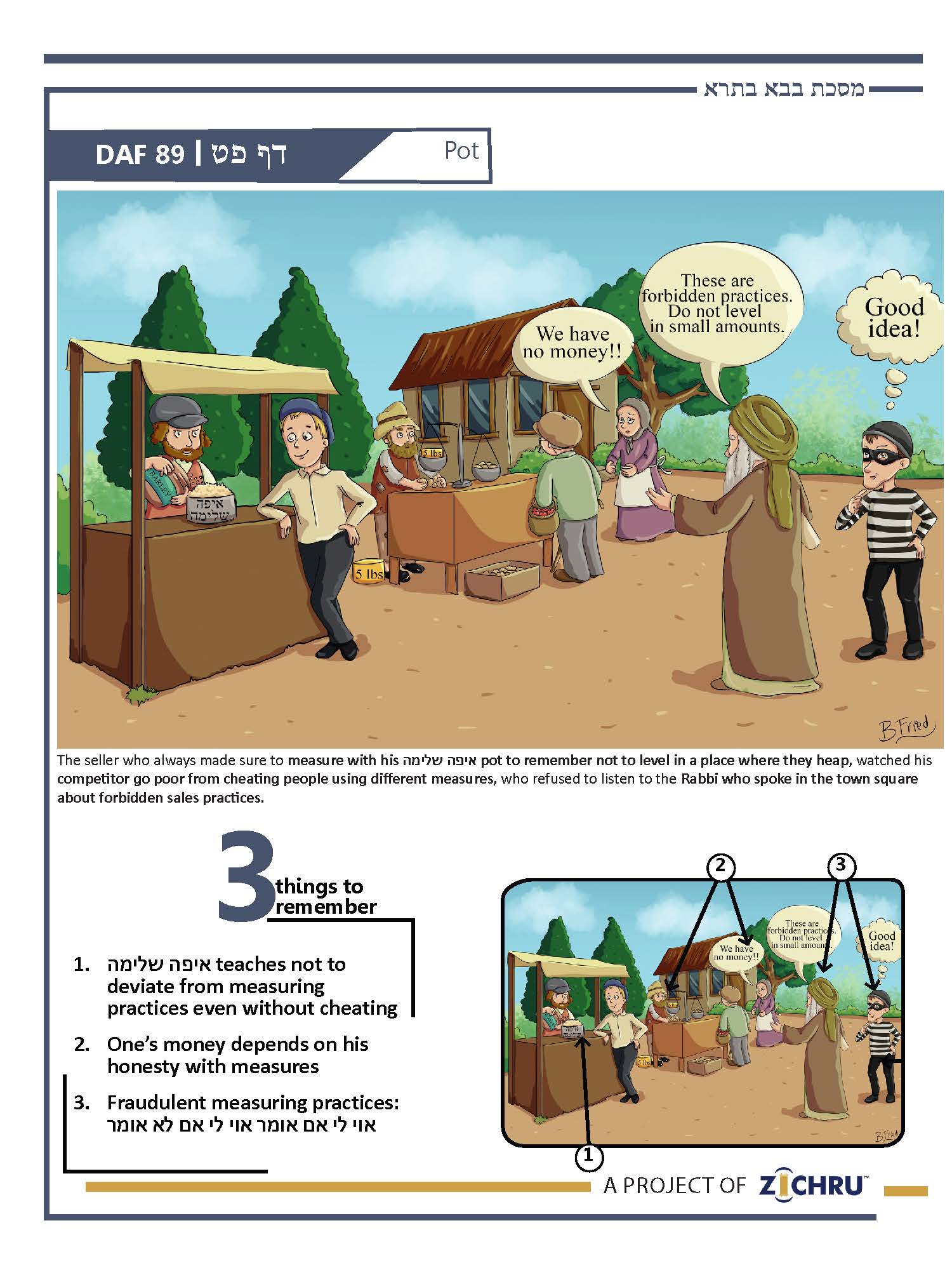Bava Basra - Daf 89
- Audio Timestamps
0:00 - The 3 Sugyos
2:58 - Review of 3 Sugyos
5:38- Siman
8:10 - 4 Blatt Back Chazarah
15:10 - Pop Quiz (Last 7 blatt)
For access to all Zichru resources including PDFs, and illustrations CLICK HERE
- איפה שלימה teaches not to deviate from measuring practices even without cheating
The Mishnah on Daf 88b taught that where it is customary to level a measure, one may not heap a measure, and vice versa. A Baraisa states: מנין שאין מוחקין במקום שגודשין – from where do we derive that one may not level the measure in a place where they heap it (even where the buyer agrees to receive less), ואין גודשין במקום שמוחקין – nor heap it in a place where they level it (even where the seller agrees to give more)? The passuk says: איפה שלמה – a perfect measure, implying that fraud may not result from one’s measure. Someone may infer from their action that this is the local custom, which will lead to actual deceit. The Baraisa continues that even if the seller said, “I will level the measure in a place where they usually heap it, but I will reduce the price” (or the reverse), this is also forbidden, because the passuk says: איפה שלמה וצדק יהיה לך – a perfect and just measure you shall have, teaching to avoid even an unlikely possibility of resulting fraud. Here, someone may not realize that the price was adjusted.
The same derashos are made regarding the practices to tilt or balance a scale.
- One’s money depends on his honesty with measures
Rav Yehudah of Sura darshened: לא יהיה לך בביתך – the passuk says “you will not have in your house,” meaning you will not have money. מה טעם – Why? משום איפה ואיפה – Because you used a measure and a measure, i.e., a large one for buying and a small one for selling. Similarly, the passuk says: לא יהיה לך בכיסך – “you will not have in your pouch,” meaning money. מה טעם – Why? משום אבן ואבן – because you used a weight and a weight, i.e., different sizes for buying and selling. He darshens the passuk’s conclusion: אבל אבן שלמה וצדק – But if you keep “a perfect and just weight,” יהיה לך – you will have (money), איפה שלמה וצדק יהיה לך – and if you will keep “a perfect and just measure,” you will have (money).
- Fraudulent measuring practices: אוי לי אם אומר אוי לי אם לא אומר
A Baraisa teaches that one cannot make a level with one wide side and one narrow side, because he can use the wide end (which does not level as deeply) when selling, and the narrow side when buying. לא ימחוק בבת אחת – One may not level the entire measure at once quickly, because this is רע למוכר ויפה ללוקח – bad for the seller and good for the buyer, nor should he level in small amounts, which is bad for the buyer. Rather, he should level once slowly, or in two sweeps. Regarding all these practices, Rabban Yochanan ben Zakkai said: אוי לי אם אומר – Woe is me if I speak about these forbidden practices, אוי לי אם לא אומר – and woe is me if I do not speak about them. If I do, שמא ילמדו הרמאין – perhaps the deceivers will learn how to cheat. If I do not, perhaps the deceivers will say: אין תלמידי חכמים בקיאין במעשה ידינו – “The talmidei chochomim are not familiar with our activities,” and increase their activities. Ultimately, he did speak about them, based on the passuk: כי ישרים דרכי ה' – for Hashem’s way are straight, וצדיקים ילכו בם ופושעים יכשלו בם – and the righteous walk in them, and the wicked stumble in them. Thus, it is worth teaching the righteous how to avoid cheating, although the wicked may take advantage of the information.
Siman – Pot
The seller who always made sure to measure with his איפה שלימה pot to remember not to level in a place where they heap, watched his competitor go poor from cheating people using different measures, who refused to listen to the Rabbi who spoke in the town square about forbidden sales practices.


